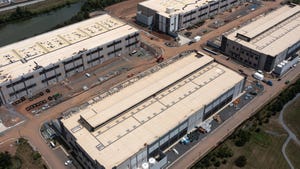Large Reno Project to Generate Its Own PowerLarge Reno Project to Generate Its Own Power
A new data center project in Reno, Nevada plans to provide at least 440 megawatts of on-site power generation from natural gas and renewables, expanding the traditional role of the data center builder.
November 15, 2010
Data centers are in the business of supplying power, and lots of it. But that usually means creating a mission-critical environment supported by electricity from a local utility. An ambitious new project near Reno, Nevada plans to expand the data center development model to include massive on-site power generation from multiple sources in addition to a power feed from the local utility.
The Reno Technology Park is a 2,200 acre property being developed by the Unique Infrastructure Group, which plans to provide at least 300 megawatts of on-site power generation from natural gas, along with on-site renewable energy sources that could provide an additional 140 megawatts. The developers believe the abundant supply of land and power can support up to 1.5 million square feet of data center space, built over time, with the first facilities coming online in early 2012.
One of the partners in the Reno Technology Park is KC Mares, an industry veteran who has been involved with major data center projects for Google, Yahoo and Exodus Communications. Mares, who has recently focused on the design of "ultra-low PUE" data centers, says the development group is working with a financial partner to raise up to $800 million in funding to support the project.
Alignment of Economics, Climate, Connectivity
Mares says the Reno site offers an unusual combination of favorable economics, climate and connectivity that make it an ideal site for large-scale data centers. The key differentiator will be the project's approach to energy, which enlarges the traditional role of the data center builder to act as both landlord and electric utility.
"Our plan is to provide on-site power from our own power plant from day one," said Mares. "Two large natural gas transmission lines run through the property. We are going through the design and permitting for a 300 megawatt natural gas power plant on the campus. We also are in negotiations to buy a natural gas power plant that is adjacent to the property."
The plans for Reno Technology Park include on-site generation of multiple renewable energy sources, including 100 megawatts of wind power, a 20-megawatt installation of photovoltaic solar panels and up to 20 megawatts of geothermal energy. The site is within a mile of a Nevada Energy power island featuring 540 megawatts of capacity.
The Growing Importance of Power
With major data centers requiring between 10 and 60 megawatts of critical power, the supply and cost of electricity has become one of the primary factors driving site location decisions. Mares said the multiple on-site generation sources, combined with the available utility power, will give tenants at the Reno park extraordinary flexibility and redundancy in sourcing electric power, including the capability to run completely "off the grid."
He estimates that the on-site generation will be able to provide customers pricing of 5.5 cents per kilowatt hour in 2012. The use of natural gas also offers the opportunity to use hedging strategies to manage the future cost of power, which could address concerns about carbon regulation driving up the cost of electricity in some regions.
Reno Technology Park is leading with its power story, but also touting other features relevant to site selection decisions:
A dry climate supporting up to 6,500 hours a year of air-side economization
Multiple Tier 1 fiber providers along Route 80
Favorable disaster profile, with low incidence of natural disasters.
Abundant water resources.
Tax climate: Nevada has no corporate income tax or personal income tax, which may appeal to companies generating revenue from their facilities.
"We're going to be very cost-competitive with anyplace else in the country," said Mares, who said the project has attracted interest from companies in the financial services sector, which typically locate their data centers near trading hubs or major business markets rather than rural areas. Mares declined to identify any of the potential tenants, but said Reno Technology Park is in advanced negotiations with a large user on a 20 megawatt facility.
About the Author
You May Also Like







